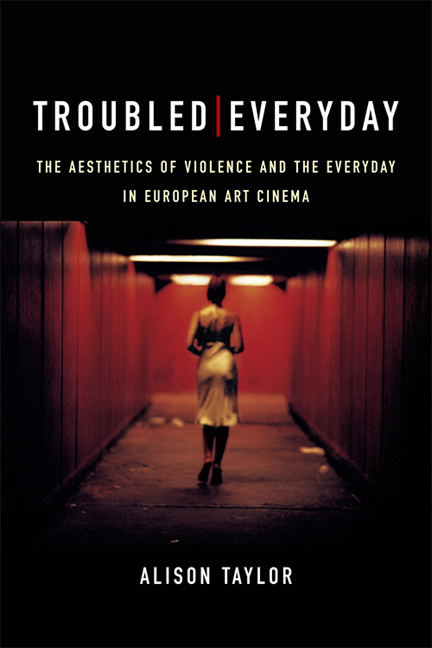2 - Everyday Moments
Published online by Cambridge University Press: 22 December 2017
Summary
When Pier Paolo Pasolini's Salò or the 120 Days of Sodom – an updated adaptation of de Sade's literary masterwork of torture and degradation – screened at the New York Film Festival in 1977, Vincent Canby was unimpressed. For Canby, Pasolini's relocation of the novel's characters from their eighteenth-century castle in Southern Germany to the fall of the Mussolini regime was an intellectual and political statement that works ‘on paper’, but cannot be realised onscreen with the same theoretical distance. Writing for The New York Times, Canby states:
For all of Mr Pasolini's desire to make ‘Salo’ an abstract statement, one cannot look at the images of people being scalped, whipped, gouged, slashed, covered with excrement and sometimes eating it and react abstractly unless one shares the director's obsessions. Far from being the ‘agonized scream of total despair’ the New York Film Festival calls the film, it is a demonstration of nearly absolute impotency, if there is such a thing. Ideas get lost in a spectacle of such immediate reality and cruelty. (1977a: 11)
A week later, Canby continued his attack in another article, comparing the film's simulated perversions to the ‘simulated … intelligence that attempts to justify this sort of sensational (sometimes vomit-inducing) imagery as a political statement’ (1977b: 32). And just one year earlier, Canby had published a more general lamentation at the state of excessive violence in cinema both at home and abroad in an article entitled ‘Explicit Violence Overwhelms Every Other Value on Screen’. In this piece (written before Canby had seen Salò) Pasolini's ‘attempt to make political point out of scenes of systematized rape, castration and other forms of amputation, disembowelment, defecation, and such’ only warrants one sentence amid a catalogue of grizzly moments in then-recent films including Taxi Driver (Scorsese 1976), In The Realm of the Senses (Oshima 1976) and The Last Woman (Ferreri 1976), among several others. While Canby finds the violence of Schlesinger's Marathon Man (1976) acceptable for what he regards to be the film's greater artistry, he laments that in an increasing number of films – ‘movies made without any art and with no purpose except to shock’ – graphic violence becomes an end in itself (1976: 69).
- Type
- Chapter
- Information
- Troubled EverydayThe Aesthetics of Violence and the Everyday in European Art Cinema, pp. 16 - 36Publisher: Edinburgh University PressPrint publication year: 2017



